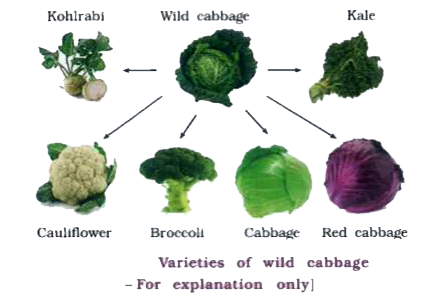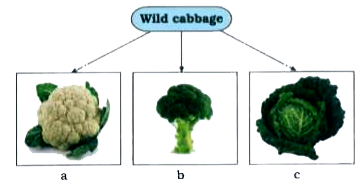Explain evolution from wild cabbage using the artificial selection.Solution in Gujrati
Varied organisms are evolved from common ancestor.
From wild variety of cabbage several different varieties of plants are cultivated by artificial selection. Before two thousand years farmers were an edible variety of producing wild cabbage plant. Its closely arranged leaves at short distances were used as food.
Some farmers have obtained variety of cabbage in which flower development was arrested and then they were cultivated as broccoli.
Some farmers have obtained variety of cabbage having sterile flowers and they were cultivated as cauliflower.
Some farmers selected the swollen portion of the wild cabbage and developed new variety called Kohlrabi from this.
Some farmers have developed a few larger leaves of the wild cabbage as a new variety called Kale, a leafy vegetable.
All these varieties are apparently quite different individually from the ancestral wild cabbage.

Topper's Solved these Questions
- HEREDITY AND EVOLUTIONBOOK - KUMAR PRAKASHANCHAPTER - HEREDITY AND EVOLUTIONEXERCISE - TEXTUAL EXERCISE
12 Videos
- HEREDITY AND EVOLUTIONBOOK - KUMAR PRAKASHANCHAPTER - HEREDITY AND EVOLUTIONEXERCISE - ADDITIONAL QUESTIONS AND ANSWERS
18 Videos
- CONTROL AND COORDINATIONBOOK - KUMAR PRAKASHANCHAPTER - CONTROL AND COORDINATIONEXERCISE - PRACTICAL SKILL BASED QUESTIONS WITH ANSWERS
8 Videos
- HOW DO ORGANISMS REPRODUCE?BOOK - KUMAR PRAKASHANCHAPTER - HOW DO ORGANISMS REPRODUCE?EXERCISE - PRACTICAL SKILL BASED QUESTIONS WITH ANSWERS
5 Videos
Similar Questions
A Mendelian experiment consisted of breeding tall pea plants bearing violet flowers with short pea plants bearing white flowers. The progeny all bore violet flowers, but almost half of them were short. This suggests that the genetic make-up of the tall parent can be depicted as ……..... a. TTWW b. TTwW c. TtWW d. TtWw
View SolutionDistinguish between :
Acquired characteristics and Hereditary characteristics
View SolutionFour different students of your class observed network of neurons in a slide under microscope. They drew a diagram of synaptic junction.
From your knowledge.
Which of the following figures shows the correct pathway for the conduction of impulse ?
View SolutionCollect different flowers such as Maize, Sunflower, Papaya, Hibiscus, Datura, Rose, Crinum, etc. Which of them are bisexual ? Draw diagram of any one bisexual flower and state function of each parts.
View SolutionName five varieties of vegetables which have been produced from 'wild cabbage' by the process of artificial selection.
View SolutionChoose the one term from the following which includes the other three : broccoli, wild cabbage, cauliflower, cabbage
View SolutionOne of the following has not been produced from wild cabbage by the process of artificial selection. This one is :
View Solution[A]: Cabbage, cauliflower, Kohlrabi, Broccoli and Brussels have descended from a com- mon ancestor Colewort (Brassies oleracea).
[R]: These varieties were produced through selective breeding (artificial selection) of do- mesticated wild species
View Solutionमनुष्य ने कृत्रिम चयन द्वारा जंगली गोभी के पुष्पों की वृद्धि को रोक कर कौन -सी सब्जी का विकास किया है ?
View SolutionHow were farmers able to obtain present day cabbage, cauliflower and broccoli from wild cabbage?
View SolutionName five varieties of vegetables which have been produced from 'wild cabbage' by the process of artificial selection.
View SolutionChoose the one term from the following, which includes the other three :
Broccoli, wild cabbage, cauliflower, cabbage.
View Solution
Name the diagrams a, b and c and from which part of the wild cabbage are they obtained ? Which method is used for obtaining these ?
View SolutionWhich of the following are examples of artificial evolution ? Wild cabbage, green beetle, kale, kohlrabi, brown skin human, low weight beetle, red cabbage
View Solution[A]: Cabbage, cauliflower, Kohlrabi, Broccoli and Brussels have descended from a com- mon ancestor Colewort (Brassies oleracea). [R]: These varieties were produced through selective breeding (artificial selection) of do- mesticated wild species
View Solution
